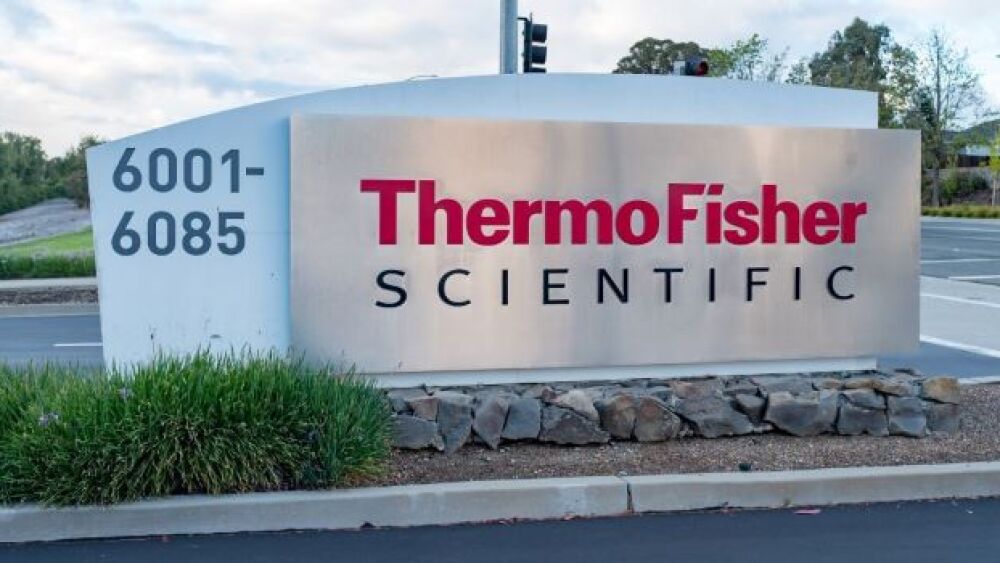Thermo Fisher and the University of California partnered with the development and manufacturing of cell-based therapies with the construction of its 44,000 sq. ft. manufacturing facility.
Smith Collection/Gado/Getty Images
Thermo Fisher Scientific and the University of California, San Francisco partnered to accelerate the development and manufacturing of cell-based therapies with the construction of a 44,000-square-foot development and manufacturing facility.
Thermo Fisher will build the state-of-the-art site on the college’s Mission Bay campus. The campus is a center of biotech and medical innovation.
The campus currently includes biomedical research facilities and hospitals. The Thermo Fisher facility will provide clinical and commercial cGMP cell therapy manufacturing services and associated technology development support to UCSF and other partners, the company said in an announcement.
The new manufacturing facility is expected to open in 2022. When it opens, the facility will serve as a central location for customers and UCSF researchers to gain access to the company’s Cell Therapy Systems reagents, consumables, fit-for-purpose instrumentation compliant software.
Thermo Fisher said the product portfolio is designed to work together as scientists transition their work from the research stage to clinical manufacturing.
Mark Stevenson, executive vice president and chief operating officer of Thermo Fisher Scientific, said the facility brings together the university’s leadership in cellular immunotherapy research with Thermo Fisher’s capabilities in cell therapy instrumentation, manufacturing and distribution.
“This powerful combination will provide customers – from emerging biotechs to large pharma companies – with integrated, end-to-end solutions to reduce costs and accelerate adoption of cell therapies, ultimately improving patient access to these transformative treatments,” Stevenson said in a statement.
UCSF Chancellor Sam Hawgood said the establishment of the Thermo Fisher facility on the Mission Bay campus would enable the university’s scientists to “to catalyze innovation in living therapeutics and use the resulting discoveries to benefit our patients.”
Neither Thermo Fisher nor UCSF indicated how many people the new facility will employ when fully operational.
Thermo Fisher Scientific isn’t the only company to open a new manufacturing facility. This morning, it was reported that Pfizer is spending $40 million to expand a manufacturing site in Ireland to support the manufacture of its COVID-19 vaccine.
This will be the only Pfizer facility outside of its Michigan plant to manufacture the vaccine. The expansion is expected to add 75 jobs.
For Pfizer, the expansion of the Grange Castle facility is on top of a €300 million investment in three other Irish plants Pfizer announced last year.
Manufacturing the vaccine outside of the United States will boost the availability of the COVID-19 drug across Europe and the globe. Pfizer’s partner BioNTech has also been expanding its manufacturing capabilities, recently announcing plans for a manufacturing site in Singapore.
Pfizer and BioNTech are currently seeking expanded authorization for its vaccine from the European Medicines Agency. The companies hope the EMA will follow the U.S. Food and Drug Administration in authorizing the use of the vaccine for adolescents ages 12 to 15. The companies are also running trials to use the vaccine in children from six months old to 11 years.
Also, this morning, Moderna announced plans to open a business services hub in Poland. The facility, called the Moderna International Business Services (MIBS) Center, complements six other facilities the company has established across Europe as it builds out its global infrastructure.
The Poland facility will provide finance, pharmacovigilance, human resources, and digital services, Moderna said. The MIBS Center is expected to employ approximately 160 staff when fully operational. Operations are expected to begin in the third quarter of this year.
“We’re delighted to be expanding our footprint in Europe,” Stéphane Bancel, chief executive officer of Moderna said in a statement. “Warsaw is a compelling location for this global business services hub given its access to talent, costs of operations, business climate and infrastructure quality.”





